Brzezinski, US, Azerbaijan: How the geopolitical course was set A historical overview
In the context of epochal geopolitical shifts linked to Azerbaijan’s emergence as an integral part of the Central Asian Countries’ Consultative Meeting, some analysts have recalled a well-known term coined by the prominent American strategist Zbigniew Brzezinski—the “Eurasian Balkans.”

This concept first appeared in his influential work The Grand Chessboard (1997). By including the countries of Central Asia, the South Caucasus, and Afghanistan within the “Eurasian Balkans,” Brzezinski underscored that the primary object of contention among the world’s leading powers in this region is access to an area of potentially enormous wealth, where geopolitical power is at stake. He particularly highlighted the crucial question for the future of the Caspian Sea basin regarding pipeline routes, identifying Kazakhstan, Uzbekistan, and Azerbaijan as key players—with Azerbaijan holding central importance due to its vast energy resources.
According to Brzezinski, an independent Azerbaijan, connected to Western markets through pipelines, would become a major transit hub, granting energy-consuming economies access to Central Asia’s resources. He also emphasised the necessity of constructing the Baku–Ceyhan (Türkiye) oil pipeline, which would serve as the main outlet for the Caspian basin’s energy resources.
From today’s perspective, Brzezinski’s analysis appears especially prescient.
Yet even before the release of this influential work, National Leader Heydar Aliyev had already taken decisive steps to strengthen Azerbaijan’s independence—often under extremely challenging conditions, when the very statehood of the country was under direct threat.
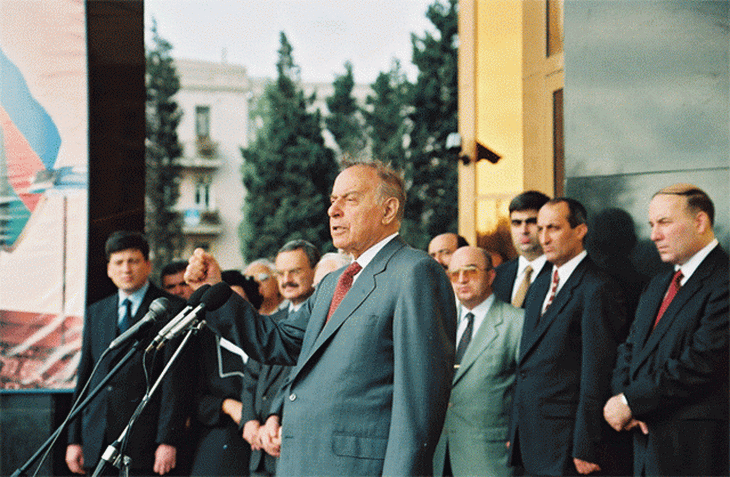
On June 15, 1993, having been elected Chairman of the Azerbaijani Parliament, Heydar Aliyev, just two months later, in August, during a meeting with representatives of leading global oil companies, voiced a key point: most of these corporations are “closely linked to the state circles they represent.” For this reason, their activities in Azerbaijan provided grounds to hope for a further improvement in these countries’ relations with our state. In other words, Heydar Aliyev tied the signing of oil agreements to political support for Baku from the states participating in the future contract.
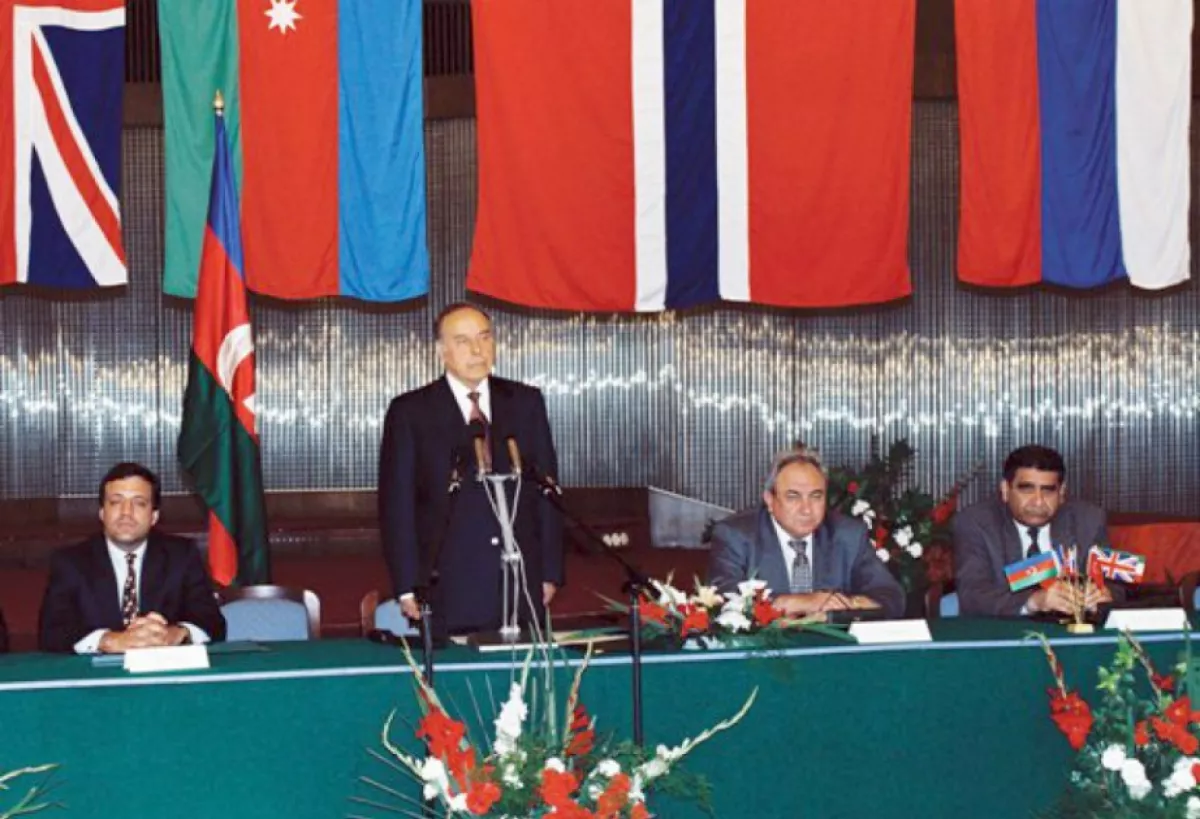
Then, in 1994, at the ceremony for signing the famous “Contract of the Century,” the National Leader emphasised its benefits “from an economic perspective for both the present and the future of Azerbaijan,” adding that this cooperation would allow the country to take its rightful place in the global economic community. In the same year, Heydar Aliyev identified the passage of the pipeline through Türkiye as strategically important.
In this context, it is important to make a brief excursion into the unique format of special mutual understanding that emerged at the turn of the 20th–21st centuries between two outstanding figures — Heydar Aliyev and Zbigniew Brzezinski. This “internal aura,” which went far beyond a purely geopolitical framework, became one of the defining factors in the progressive development not only of Azerbaijan but also of the Central Asian countries and Georgia.
Moreover, it significantly contributed to the establishment of serious, stable relations between Baku and Washington — a fact that became especially evident against the backdrop of recent developments in the strategically important Azerbaijan–Central Asia space.
According to Brzezinski’s recollections, he first met the National Leader “in the early 1990s,” when he made his first trip to the region in the capacity of special emissary of the 42nd U.S. President, Bill Clinton, to meet with Heydar Aliyev.
In July 1997, on the eve of the National Leader’s visit to the United States, Brzezinski, calling Azerbaijan “a very important country” and its leader “a prominent statesman,” stressed that Bill Clinton “would benefit from discussions with you.”
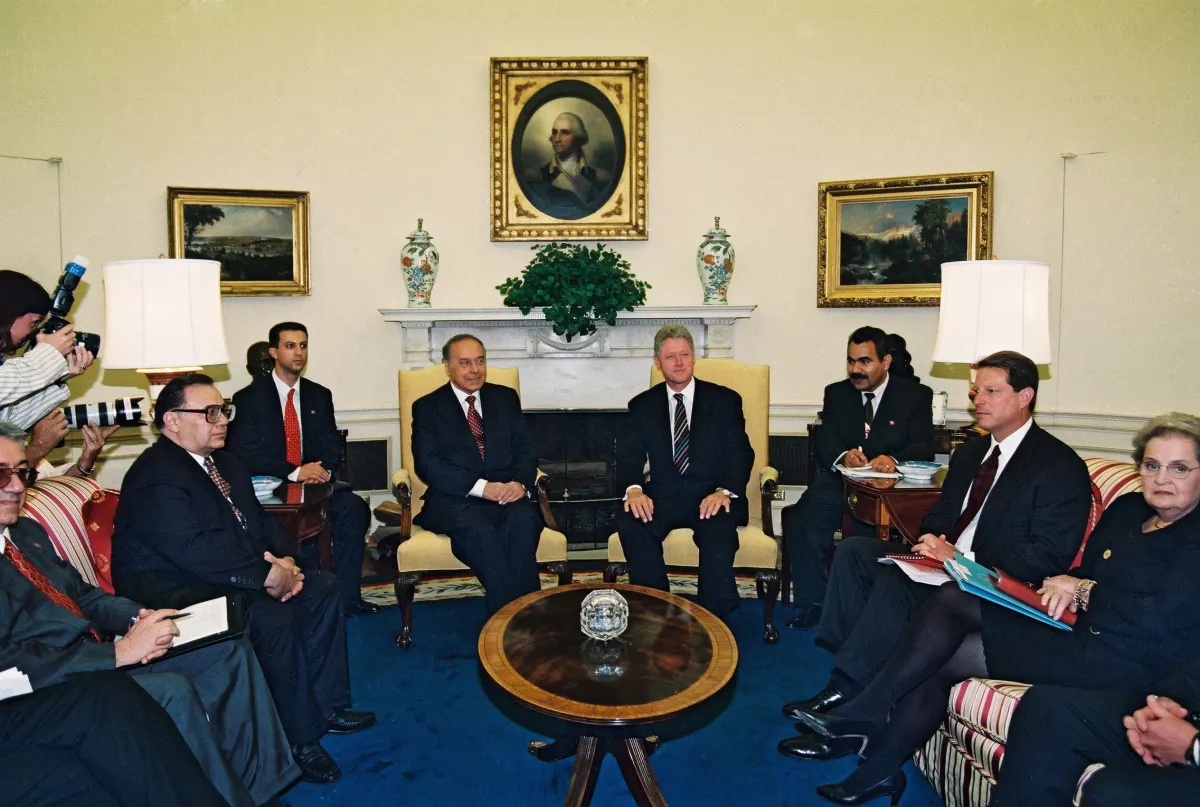
On August 1, the parties signed a Joint Statement in Washington, which underscored the importance of expanding the partnership through the strengthening of bilateral relations in the fields of politics, security, economy, and trade.
The following year, Brzezinski noted that, thanks to Heydar Aliyev’s thoughtful policies, one could speak of a bright future for Azerbaijan, whose people have every right to look ahead with optimism. According to him, the international economic ties fostered under Heydar Aliyev’s initiative and leadership would bring prosperity and well-being to the Azerbaijani people.
In the same year, 1998, Baku, Tbilisi, and Ankara designated the Baku–Tbilisi–Ceyhan (BTC) route as the main export pipeline.
At a meeting held in early 2000 in Washington with Brzezinski, the National Leader emphasised that the restoration of peace and security in the South Caucasus is inevitable not only for the peoples of the region but for humanity as a whole. From this perspective, he stressed that the further strengthening of the Azerbaijan–U.S. strategic partnership is one of the most important priorities of the day, especially since such a process is mutually beneficial for both countries.
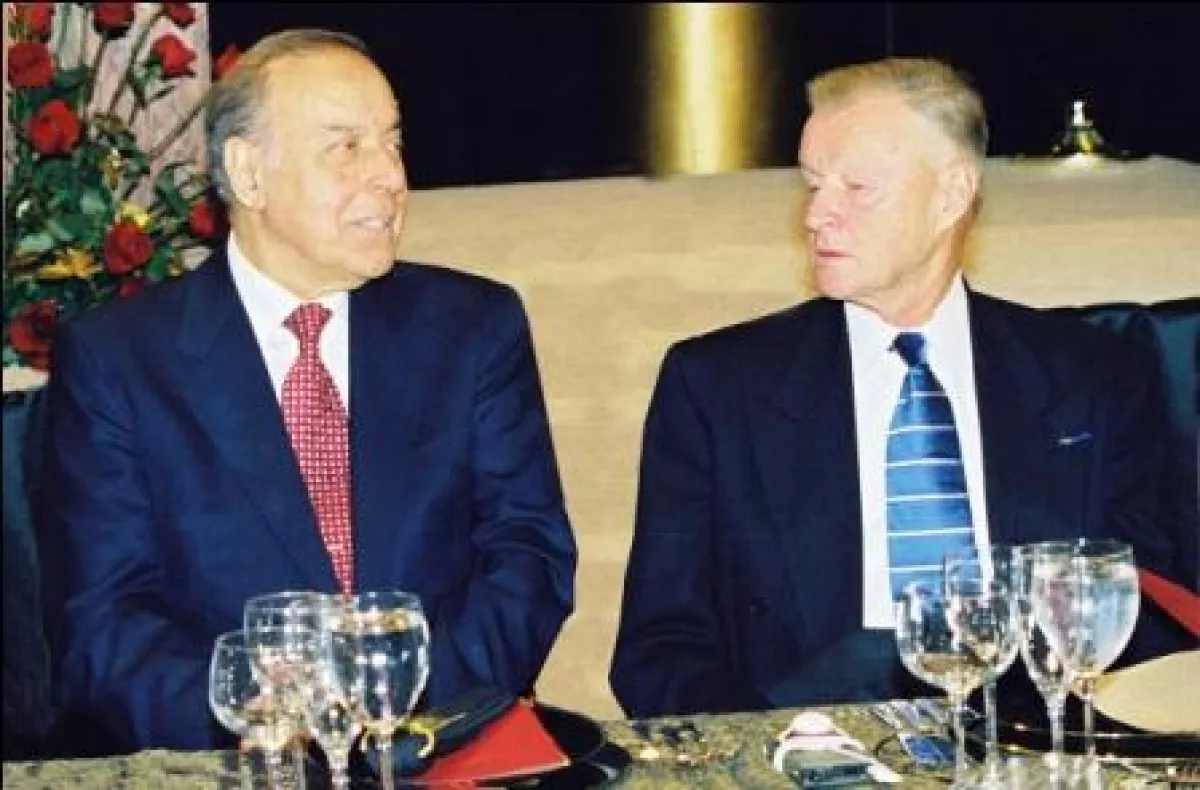
Later, at the end of 2000, during a meeting between Heydar Aliyev and representatives of the U.S. Senate, Zbigniew Brzezinski’s son, Ian Brzezinski, informed the National Leader that his father “spoke with great enthusiasm about you, about Azerbaijan, and about U.S.–Azerbaijan relations.”
In response, Heydar Aliyev, calling the elder Brzezinski a close friend and a person he sincerely respected, described him as a realist politician. He noted that through their meetings, he had become increasingly convinced of Zbigniew Brzezinski’s exceptional intellect and his fair, measured approach to world politics. According to the National Leader, Brzezinski consistently demonstrated to everyone the importance and necessity of Azerbaijan for the United States in the region.
Moreover, during his visits to Azerbaijan, Brzezinski also met with refugees living in tent settlements and later shared his observations, including information on the occupation of Azerbaijani lands, wherever necessary, including with various U.S. circles.
In November 2003, Zbigniew Brzezinski was received by President Ilham Aliyev, who noted that he had witnessed the deep friendship between Brzezinski and Heydar Aliyev. In harmony with this, the President emphasised that Azerbaijan would continue to develop based on the principles established by the National Leader. In turn, Brzezinski expressed how deeply impressed he was by the major transformations the country had undergone over the past ten years, thanks to Heydar Aliyev’s policies.
After the passing of the National Leader in the same year, Zbigniew Brzezinski, expressing his condolences to Heydar Aliyev’s political successor, described him as a decisive and far-sighted statesman with a clear mind. “You are as proud of him as he was of you. We wish you success in continuing his work,” he emphasised.
In 2010, calling Heydar Aliyev the founder of modern Azerbaijan, Brzezinski described him as a visionary leader who, in critical historical moments, made a strategic decision — choosing the Baku–Ceyhan route. According to Brzezinski, Heydar Aliyev always placed the sovereignty of the state and the interests of the people above all else. At the same time, he noted that Azerbaijan, as an important link in the region, had established itself as a successfully developing country.
The special nature of the relationship between these two outstanding figures was summarised in 2017 by President Ilham Aliyev. Expressing condolences to the widow of Zbigniew Brzezinski upon his death, the President stressed that the late statesman had earned high international authority and made a significant contribution to the promotion of peace, security, and stability worldwide. He described Brzezinski as a friend of Azerbaijan, noting his invaluable role in developing relations and strengthening friendly ties between Azerbaijan and the United States after the country gained independence.
Arguably, all of the above speaks for itself and requires no further commentary — except to highlight one key fact: the foundation of Azerbaijan’s current successes was laid by the National Leader.
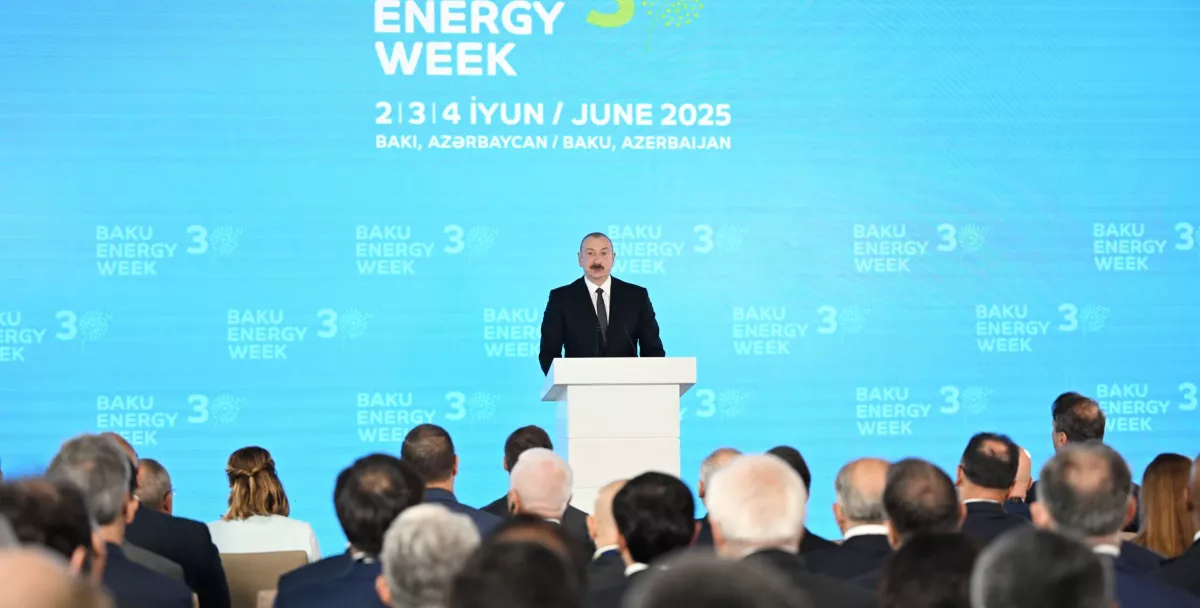
As emphasised in summer 2025 by President Ilham Aliyev, the path to true independence for Azerbaijan effectively began with the signing of the “Contract of the Century,” which transformed the entire geopolitical and geo-economic landscape of the region. This was made possible thanks to the foresight of Heydar Aliyev, who clearly understood that without broad international cooperation — particularly in the energy sector, then arguably the only competitive part of the national economy — the country would not only struggle to overcome extreme difficulties but also would not achieve genuine independence.
Although landlocked, Azerbaijan, through massive investments in transport infrastructure, is today considered one of the key transport hubs of Eurasia. Our energy projects have also fundamentally reshaped the continent’s energy map.
As a result, according to the President, strategic pipelines connecting the Caspian Sea with the Black Sea and the Mediterranean were gradually built together with our partners. The crowning achievement of this work was the Southern Gas Corridor, extending from Azerbaijan’s offshore fields all the way to Italy.
In this context, it should be noted that Azerbaijan’s emergence at the current historical stage as a full participant in the Consultative Meetings of Central Asian Countries is shaping new geopolitical trends across our shared region. This is a logical result of all the steps taken by official Baku over the past decades. Today, Azerbaijan is a major logistical hub for the South Caucasus and Central Asia, and the Middle Corridor, an important segment of which is the so-called “Trump Route,” is considered by leading analysts as a significant factor ensuring the predictability and flexibility of supply chains between Asia and Europe.
Thus, the grandmaster moves of Heydar Aliyev, who carefully calculated the prospects of each step in terms of protecting national interests, laid the foundation that brought Azerbaijan to its current level. The subsequent development has been ensured by President Ilham Aliyev. In this context, the unique format of personal relations — which grew into a strong friendship — between these two outstanding figures, the National Leader and Zbigniew Brzezinski, is particularly evident.








